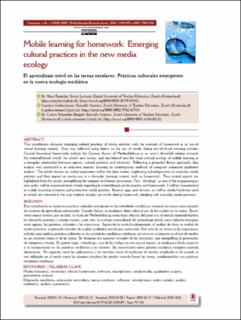Bitte benutzen Sie diese Kennung, um auf die Ressource zu verweisen:
https://doi.org/10.21256/zhaw-21641| Publikationstyp: | Beitrag in wissenschaftlicher Zeitschrift |
| Art der Begutachtung: | Peer review (Publikation) |
| Titel: | Mobile learning for homework : emerging cultural practices in the new media ecology |
| Autor/-in: | Rummler, Klaus Grabensteiner, Caroline Schneider Stingelin, Colette |
| et. al: | No |
| DOI: | 10.3916/C65-2020-09 10.21256/zhaw-21641 |
| Erschienen in: | Comunicar |
| Band(Heft): | 28 |
| Heft: | 65 |
| Seite(n): | 97 |
| Seiten bis: | 106 |
| Erscheinungsdatum: | Okt-2020 |
| Verlag / Hrsg. Institution: | Grupo Comunicar |
| ISSN: | 1134-3478 1988-3293 |
| Sprache: | Englisch |
| Schlagwörter: | Media education; Social media |
| Fachgebiet (DDC): | 302.23: Medien 371: Schulen und schulische Tätigkeiten |
| Zusammenfassung: | This contribution discusses emerging cultural practices of media activities with the example of homework as an out-of-school learning context. Data was collected using diaries on the use of media during out-of-school learning activities. Central theoretical frameworks include the German theory of Medienbildung as an actor’s threefold relation towards the material/factual world, the other/s and society, and her-/himself and the socio-cultural ecology of mobile learning as a triangular relationship between agency, cultural practices and structures. Following a grounded theory approach, data analysis was conducted in an inductive manner, drawing on contemporary methods of computer enhanced qualitative analysis. This article focuses on verbal expressions within the diary entries, implicating cultural practices in everyday media activities and their impact on media use in a domestic learning context, such as homework. Two central aspects are highlighted from the results, exemplifying the category and theory generation. First, “checking”, as one of the reappearing in-vivo codes, will be examined more closely regarding its embedding in media practice and homework. It will be characterised as a daily recurring receptive and productive media practice. Second, apps and services, as well as media hardware used at school, are mirrored in the way students actually use media during homework, mingling with everyday media practices. |
| URI: | https://digitalcollection.zhaw.ch/handle/11475/21641 |
| Volltext Version: | Publizierte Version |
| Lizenz (gemäss Verlagsvertrag): | CC BY-NC 4.0: Namensnennung - Nicht kommerziell 4.0 International |
| Departement: | Angewandte Linguistik |
| Organisationseinheit: | Institut für Angewandte Medienwissenschaft (IAM) |
| Enthalten in den Sammlungen: | Publikationen Angewandte Linguistik |
Dateien zu dieser Ressource:
| Datei | Beschreibung | Größe | Format | |
|---|---|---|---|---|
| 2020_Rummler_etal_Mobile-learning-for-homework_Comunicar.pdf | 739.5 kB | Adobe PDF |  Öffnen/Anzeigen |
Zur Langanzeige
Rummler, K., Grabensteiner, C., & Schneider Stingelin, C. (2020). Mobile learning for homework : emerging cultural practices in the new media ecology. Comunicar, 28(65), 97–106. https://doi.org/10.3916/C65-2020-09
Rummler, K., Grabensteiner, C. and Schneider Stingelin, C. (2020) ‘Mobile learning for homework : emerging cultural practices in the new media ecology’, Comunicar, 28(65), pp. 97–106. Available at: https://doi.org/10.3916/C65-2020-09.
K. Rummler, C. Grabensteiner, and C. Schneider Stingelin, “Mobile learning for homework : emerging cultural practices in the new media ecology,” Comunicar, vol. 28, no. 65, pp. 97–106, Oct. 2020, doi: 10.3916/C65-2020-09.
RUMMLER, Klaus, Caroline GRABENSTEINER und Colette SCHNEIDER STINGELIN, 2020. Mobile learning for homework : emerging cultural practices in the new media ecology. Comunicar. Oktober 2020. Bd. 28, Nr. 65, S. 97–106. DOI 10.3916/C65-2020-09
Rummler, Klaus, Caroline Grabensteiner, and Colette Schneider Stingelin. 2020. “Mobile Learning for Homework : Emerging Cultural Practices in the New Media Ecology.” Comunicar 28 (65): 97–106. https://doi.org/10.3916/C65-2020-09.
Rummler, Klaus, et al. “Mobile Learning for Homework : Emerging Cultural Practices in the New Media Ecology.” Comunicar, vol. 28, no. 65, Oct. 2020, pp. 97–106, https://doi.org/10.3916/C65-2020-09.
Alle Ressourcen in diesem Repository sind urheberrechtlich geschützt, soweit nicht anderweitig angezeigt.